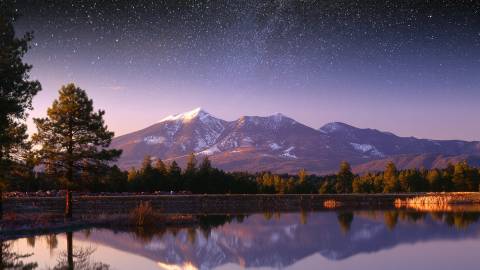
Ready for an out-of-this-world getaway?
Flagstaff is world-renowned astrotourism destination
Flagstaff’s commitment to stargazing is supported with light restrictions making it the ideal destination to explore the night skies.
No, seriously! From discovering Pluto and training astronauts to walk on the moon, to becoming the FIRST International Dark Sky City, Flagstaff has a rich lunar legacy.
On October 24th, 2001, the City of Flagstaff became the World’s First International Dark Sky City a designation awarded by the International Dark Sky Association. Flagstaff’s low light pollution and commitment to enforcing stargazing-friendly lighting restrictions make it the ideal destination to explore the night skies. Flagstaff offers stellar views of the Milky Way, weather permitting, and one shooting star after another, and then some more after that!
50,000 years-old Meteor Crater was left as the result of a meteorite (estimated to be about 150 feet across and weighing several hundred thousand tons) striking the Earth with a force 150 times greater than an atomic bomb explosion. It is now the best preserved meteor crater in the world, and while it's not the biggest, it still takes up 50 football fields! Keep an eye out for the special surprise found inside the crater, there's a telescope to help you find it.
For more than 125 years, Lowell Observatory has connected people to the universe, through education, exploration, and discovery. Lowell Observatory carved out a niche for many discoveries including Pluto. History is made every day by their brilliant team of researchers. Visitors touring the Lowell Observatory campus can look through historic and new telescopes. Events are held year-round to give people a safe eclipse viewing experience with specialized glasses specific for the experience. A Pluto Festival occurs each February to celebrate Flagstaff's role in the discovery. Lowell isn't limited to evening experiences. Telescopes can find stars and planets during daytime hours too, it's pretty incredible.
Check out the new Apollo 15 Film:
A recently released film was privately produced from archival material (visual and audio) retrieved from the period of the Apollo program. The exploration experience is further enhanced by including brief clips of familiar music during the Apollo era - this provides another dimension to the visual scenes. This :55-minute movie about the Apollo 15 mission includes a few clips showing members of the Flagstaff USGS Branch of Astrogeology support team down in Mission Control/ Houston during the mission.
Apollo 15 Commander Dave Scott stated:
"The upgraded Apollo 15 50th Anniversary film was released on the Apollo 15 Learning Hub https://film.apollo15hub.org at 10 am EST, January 10, 2024. This is an educational film, the objective of which is to provide the public with the opportunity to learn about Apollo 15 in particular and the Apollo program in general.
Follow the links below to learn more about Flagstaff's lunar legacy, role in training astronauts and mapping the moon, and more! Flagstaff is an astrotourism paradise with non-stop stellar experiences year-round and weather permitting.

Ready for an out-of-this-world getaway?
Flagstaff is world-renowned astrotourism destination

This Astrotourism Paradise is in Plain Sight
Day and Nighttime Astrotourism Activities in Flagstaff